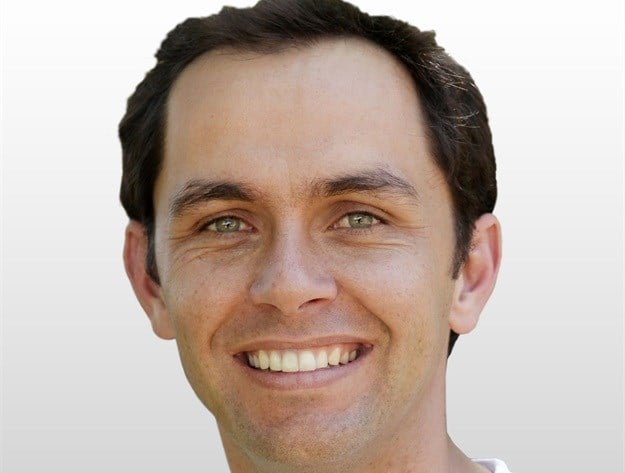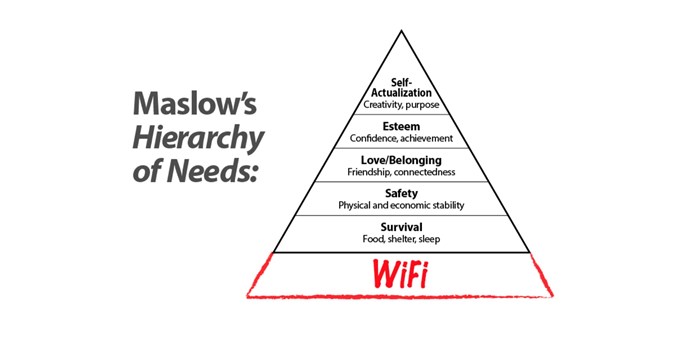What is the one thing your kids can't live without? It's not water. It's not electricity. It's not school. It's the internet.

Alan Knott-Craig, founder of Project Isizwe and executive chairman of Hero Telecoms, Ever Africa, and Happimo NPC
If you want to punish your kids nowadays, you take away the Wi-Fi and make them watch DSTV. Wi-Fi now props up Maslow’s hierarchy of needs.
There’s no point in arguing it. It just is. Wi-Fi has become a basic human need.
Why Wi-Fi? Why not 3G? Why not fibre? Why do people always talk about Wi-Fi as being what they want? It's simple: Wi-Fi is perceived as being free.
People don’t just want internet access. They want free internet access.
Two inarguable truthsThere are two inarguable truths: The demand curve for Wi-Fi is infinitely upwards. The price point of Wi-Fi is infinitely downward.
Does this mean there is no place for 3G/LTE? Of course not. There will always be a demand for connectivity on the move. Mobile data is like heroin. Once you’re on it, you can’t get off it. And people will always be willing to pay. It just won’t be for everyone.
Not everyone can afford heroin.
The future of data is the history of water. The market will be split between Perrier (fibre), bottled water (3G) and tap water (Wi-Fi).
The Perrier and bottled water will be expensive. Too expensive for most. The Wi-Fi will be free.
The person paying won't be the user
You can already hear the accountants shouting: “But there’s no such thing as free. Someone has to pay.”
That is correct. Someone has to pay. But when it comes to public Wi-Fi, that someone won’t be the user.
Public free Wi-Fi networks are already being cross-subsidised. Think of your local coffee shop. You most likely get free Wi-Fi there. Who pays? The coffee shop owner. She has done the math that the cost of paying for Wi-Fi on behalf of her customers is outweighed by the additional revenues generated by attracting and retaining her clientele.
Eventually, shopping centres will get their heads around this.
If you want foot traffic, you need to offer free Wi-Fi. No-strings-attached Wi-Fi. No login-required Wi-Fi. No advertising-supported Wi-Fi.
Simple free Wi-Fi.
Shopping centres will have to add the cost of providing free Wi-Fi to their operating expenditure, along with water, electricity and restrooms.
Even municipalities will get into the game of funding public free Wi-Fi. Eventually, people will realise that Internet access is connectivity, just like roads.
Imagine we had no public-access roads connecting Sandton to Soweto. Or Johannesburg to Cape Town. Imagine all roads were tolled. If you have no money, you have no access. If you have no money for tolls, you can’t drive from Soweto to Sandton. Our GDP would shrink. It would be madness.
Virtual highways are closed
That’s how the internet is today. The virtual highways of South Africa are closed to those who can’t afford R1/MB, which comprises at least 50% of the population.
It’s as though 50% of South Africans are barred from using the roads. 50% of South Africans cannot afford the tolls from Soweto to Sandton. South Africa’s GDP (and tax revenue) is being held back.
Once the government has done the math, like it did for roads, it will realise that the increased tax receipts associated with GDP growth will outstrip the cost of providing public free Wi-Fi for all citizens.
There is only one logical future scenario: Everyone will have access to free internet via public Wi-Fi networks.The operators of these Wi-Fi networks will be profitable, but they will not make their profits by charging customers for access. Instead, revenues will be generated indirectly. Advertising, state subsidies, data analytics, coffee shops, whatever. Whoever has a vested interest in more people being online will fund internet access on behalf of users.
You’ll have profitable telcos, and you’ll have universal internet access.
It’s inevitable, the internet will be free. It's just a question of when.



































